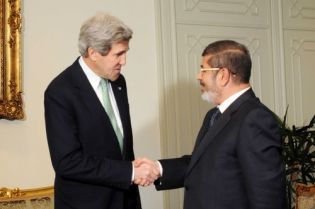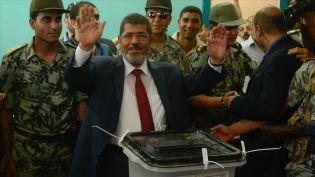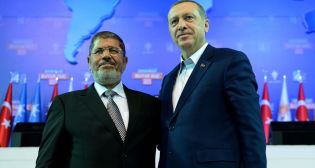
(CNSNews.com) – President Recep Tayyip Erdogan and senior Turkish officials hailed as a “martyr” Muslim Brotherhood leader Mohammed Morsi, who died in a Cairo courtroom on Monday, six years after a military takeover abruptly ended his tenure as Egypt’s first freely-elected president.
“In our eyes, he is a martyr who lost his life while fighting for his cause,” Erdogan said in a speech in Istanbul. “History will never forget those oppressors who imprisoned him, threatened him with death sentence and caused his death.”
“We had a close friendship with him both before and after his election as president,” Erdogan said, according to a transcript released by his office. “Oppressors may target the lives of the oppressed and may even kill them but they can never harm the dignity of their struggle.”
In Gaza, the Palestinian terrorist group Hamas also mourned Morsi, praising his long struggle in the service of Egypt, the Palestinian people in their “conflict with the Zionist enemy,” and “in defense of Jerusalem and al-Aqsa.”
Hamas, a U.S.-designated foreign terrorist organization, was spawned by Egypt’s Muslim Brotherhood in Gaza in 1987. Erdogan, an Islamist who rules NATO’s only Muslim-majority member, has long been an ally of both the Muslim Brotherhood and Hamas.
Egypt’s prosecutor-general, Nabil Sadek, said the 67-year-old Morsi collapsed shortly after delivering a five-minute statement to the court at his request.
Sadek said Morsi was immediately taken to hospital, “with no signs of any injuries on his body,” and was declared dead on arrival, having “no pulse, no indications of breathing and his eyes were open and unresponsive to light or stimuli.”
He said senior forensic staff would prepare a report on the cause of death. State television early Tuesday cited a medical source as saying Morsi had apparently suffered a heart attack.
The Muslim Brotherhood in a statement called Morsi’s death a “full-fledged murder,” and said it held the authorities responsible.
The group called on Muslims everywhere to pray funeral prayer in absentia for Morsi on Friday “and then to start demonstrations in all parts of the world and in front of Egyptian embassies against the authorities of the fascist military coup.”

Turbulent presidency
Morsi, an engineer and former lawmaker, was detained together with two dozen other Muslim Brotherhood leaders in early 2011, during the public uprising that brought down long-ruling autocrat Hosni Mubarak. He escaped days later, and in presidential elections held the following year – the first in Egypt to have multiple candidates – was elected president.
His often-turbulent presidency was marked by the ushering in a controversial new constitution drafted by a body dominated by Islamists, and the use of methods reminiscent of the Mubarak era to intimidate opponents and crack down on free expression.
The Obama administration criticized Morsi’s government over some of its policies, but it was viewed by many Egyptians as supportive of the Muslim Brotherhood. Former secretaries of state John Kerry and Hillary Clinton were confronted by accusations to that effect when visiting Cairo.
In the event Morsi’s tenure was cut short in July 2013 when the military, led by then army chief – later president – Abdel-Fattah El-Sisi removed Morsi amid large public protests against his Muslim Brotherhood government.
Morsi faced numerous criminal charges following his overthrow, all of which he and his co-accused described as “politically motivated.”
They included spying for Hamas and another terrorist group, the Iranian-backed Hezbollah in Lebanon; leaking secret documents to Qatar, whose government is friendly to the Muslim Brotherhood; and escaping from prison during the anti-Mubarak uprising in 2011.
He was also accused of inciting his supporters to kill protesters opposed to his presidency, insulting the judiciary, and of charges related to his leadership in the Muslim Brotherhood – which Sisi outlawed as a terrorist group during a crackdown of his own after ousting Morsi in 2013.
In trials that were widely criticized, Morsi was sentenced to death for espionage, and given lengthy prison sentences for handing secrets to Qatar, for conspiring to commit terrorist acts with foreign organizations, and for ordering the unlawful detention and torture of opposition protesters during his presidency. In 2016, an appeals court overturned the death sentence.
Morsi had a history of ill-health. A 2018 State Department human rights report cited statements by family members to the effect that Egyptian “authorities have only allowed them to visit him twice since his incarceration in 2013. They also stated he remained in solitary confinement and denied medical treatment for his diabetes, resulting in impaired vision in one eye, among other complications.”

Speaking to reporters in Istanbul, Erdogan criticized Western nations for being “silent in the face of these executions by Sisi.”
He described as “hypocrites” European Union governments which took part in a first-ever E.U.-Arab League summit hosted by “this murderer Sisi” early this year, despite the fact the E.U. is opposed to the death penalty.
Officials in Erdogan’s ruling Justice and Development party (AKP) also described Morsi as a “martyr,” as did Turkey’s interior minister, while the country’s foreign and justice ministers tweeted messages of condolence
Qatar’s emir, Tamim bin Hamad al-Thani, expressed “great sorrow” at the news of his death.
Qatar has for the past two years been at odds with its neighbors, especially Saudi Arabia and the United Arab Emirates, over alleged support for terrorism and for the Muslim Brotherhood (which several Arab Gulf states have banned.) Erdogan’s Turkey and the Iranian regime have backed Qatar in the dispute.
Source material can be found at this site.









